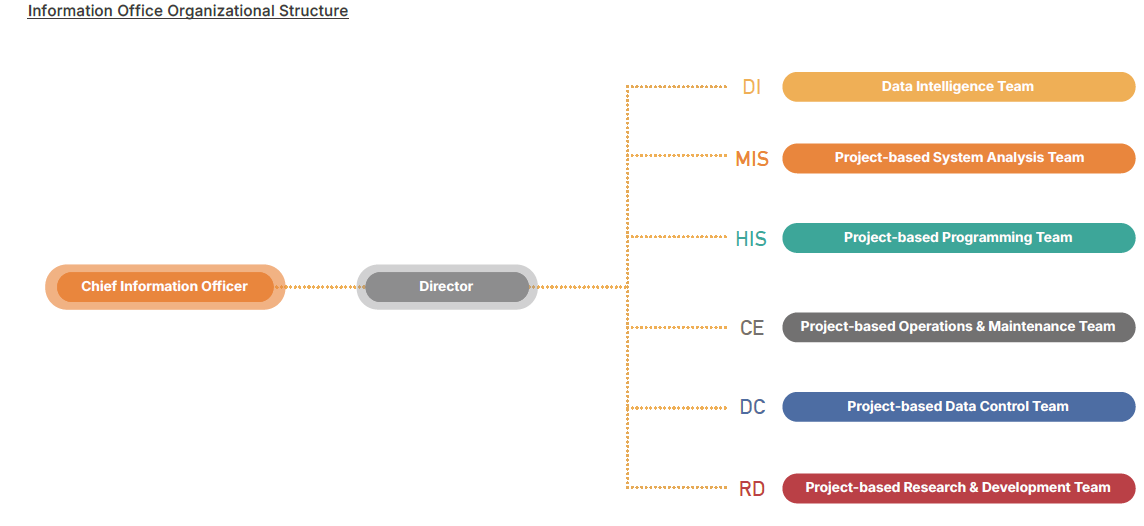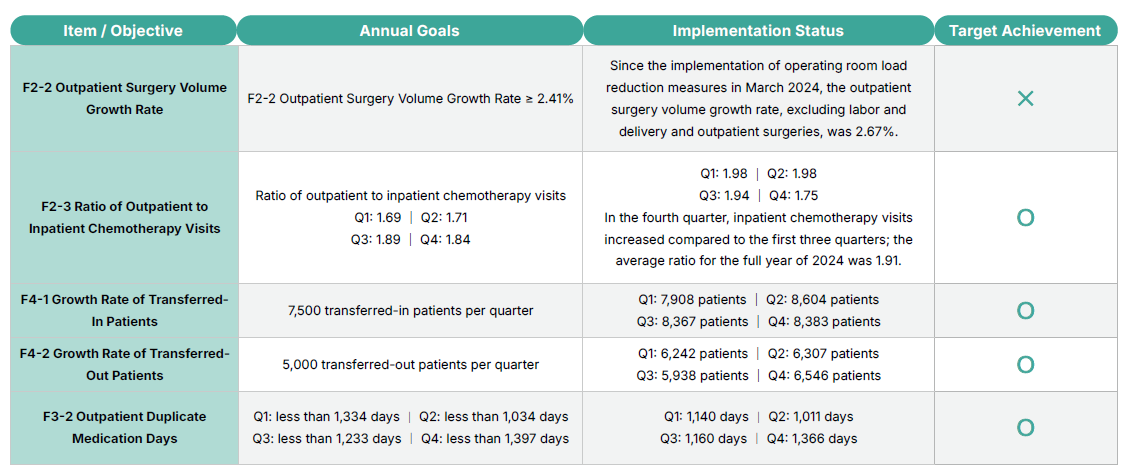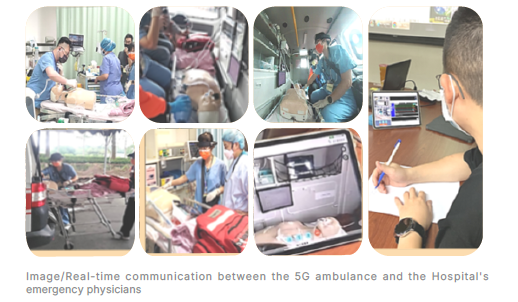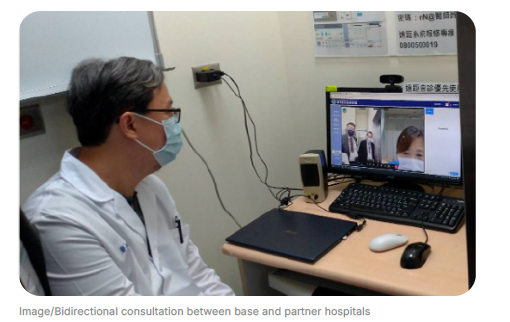Friendly Medical Services
High-Efficiency Services
-
Optimization of Medical Processes
Since its establishment in 1988, the Information Office has been committed to optimizing information services and has continuously evolved with technological advancements. To enhance efficiency and flexibility, the hospital completed system reengineering between 2009 and 2013, transitioning from a closed Tandem system architecture to an X86 platform, and fully migrating to a VB.NET and MS SQL Server environment. Simultaneously, it promoted the adoption of electronic medical records and electronic signature applications.
In response to the explosive growth of medical data, from 2015 to 2021, the Hospital introduced BI tools, integrating data across the entire hospital database, and established over 200 indicators across 30 departments, achieving automatic data integration and analysis, thereby improving decision-making efficiency and optimizing processes. Meanwhile, the introduction of new surgical systems , UDI , smart medication systems ,ICU Dashboard and RPage laid a solid foundation for the enhancement of medical quality.
In 2023, to meet modern application requirements and improve system operation and maintenance efficiency, the Information Office carried out differential updates of the core system and comprehensively upgraded the existing framework. This move not only reduced system maintenance costs but also improved system flexibility and scalability, laying a solid foundation for subsequent API integration and AI application.
Looking forward, NCKU Hospital will continue to introduce emerging technologies. From 2024 to 2025, it is actively implementing an API Gateway and developing the NCKU LLM GPT platform to strengthen system integration capabilities. Through AI technology, the precision and efficiency of medical services will be further enhanced, advancing steadily toward the goal of smart healthcare. For details on the Hospital’s medical information infrastructure and data security, please refer to “4.2 Privacy Protection.”
The Information Office reports directly to the Hospital Superintendent and is headed by a Chief Information Officer who concurrently serves as Director. The office leads the Data Intelligence Section and five major project-based teams, responsible for hospital-wide medical information system implementation, and provides 24-hour online support for computer operations. To ensure the Hospital Information System (HIS) meets the operational needs of healthcare professionals, positions such as Information Nursing Supervisors and Information Nurses have been established to communicate and assist in system planning. Through close collaboration and communication with physicians, nurses, allied health professionals, and IT technicians, user-friendly interfaces and workflows are developed to maximize the clinical benefits of smart medical systems, emphasizing not only technical operation but also clinical needs and process optimization.

NCKU Hospital has obtained the Smart Service Certification from the Joint Commission of Taiwan (JCT) in six major domains, including outpatient services, inpatient services, emergency services, surgical services, pharmaceutical services, and administrative management. The Hospital was also awarded the “Smart Hospital Organization-Wide Certification” at the 24th National Healthcare Quality Award (NHQA), demonstrating outstanding and comprehensive achievements. Looking ahead, the Hospital will continue upgrading its foundational information infrastructure and developing new systems, enabling more AI technologies to transition from the laboratory to clinical practice, thereby enhancing medical service efficiency and quality of care.

-
Teleconsultation and Emergency Medical Services
Since 2010, the Emergency Department of the Hospital has collaborated with the Xinhua Branch of Tainan Hospital, Ministry of Health and Welfare, to implement the “Island-Hopping Strategy Project for Patients with Special Injuries and Illnesses,” establishing a safe and efficient trauma patient transfer system. This joint effort aims to protect the underserved and medically under-resourced “Five Districts in Eastern Tainan” (Xinhua, Zuozhen, Yujing, Nansi, and Nanhua), ensuring that patients receive necessary treatment at local hospitals and can be safely transferred to the medical center for appropriate care within 30 minutes.
In response to technological advancements and the rise of telemedicine, in 2022, the Hospital collaborated with the Xinhua Branch and telecommunications companies to launch the “5G Smart Mobile Emergency Multilateral Teleconsultation Platform for Pre-Hospital Emergency Services,” upgrading to “Island-Hopping Strategy 2.0.” Simulation training has been completed, and the platform is ready for activation when suitable cases arise. This teleconsultation platform integrates video communication, remote patient physiological monitoring, smart ambulances, and smart wearables (such as smart glasses), enabling the transmission of patient vital signs, first-person views from pre-hospital emergency personnel, emergency care administered at the intermediate hospital, and the ambulance transfer process. All information is immediately consolidated and delivered to the emergency physicians of the Hospital, allowing them to prepare before the patient arrives and even communicate and guide on-site in real-time. This enhances emergency response time and lays the foundation for a future smart emergency medical care model before hospital arrival.
Since 2021, the Emergency Department has also implemented the Ministry of Health and Welfare’s “Telemedicine Development Project for Remote Areas.” To date, telemedicine services have been successfully provided to over 70 patients, with an average satisfaction rate of 99%. In 2024, a total of 69 teleconsultation services were conducted. The Hospital served as the base hospital, with Kuo General Hospital and the Xinhua Branch of Tainan Hospital, Ministry of Health and Welfare, as partner hospitals, and the Aodi Emergency Medical Center of the Gongliao Public Health Center designated as the emergency medical station.
Through the “Teleconsultation System,” 24-hour emergency consultations across all specialties are provided, enhancing the quality of healthcare and accessibility for under-resourced regions within the referral network. This also reinforces emergency evacuation and referral mechanisms, thereby realizing a regional joint defense system for emergency and critical care. For more information on regional joint defense efforts, please refer to Section 3.3 “Regional Healthcare Safety Network.”




